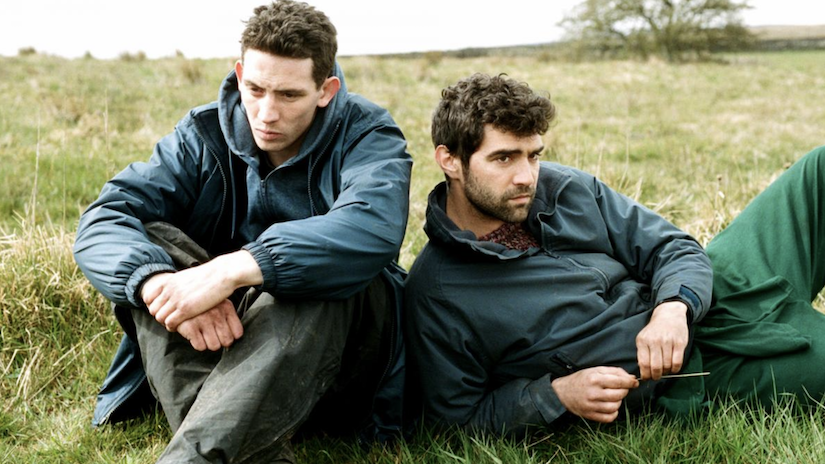From Chemsex to God’s Own Country: 15 of the best LGBTQ-themed British films of the last decade
From Pride to The Favourite, these are the films that have defined an era
By Guy Lodge

Earlier this week, to celebrate 30 years of Attitude magazine, our film reviewer Guy Lodge looked at some of his favourite British LGBTQ indies of the 90s and 00s.
From Get Real to Beautiful Thing, his fabulous selection spotlighted hidden gems and treasured triumphs alike.
Today, we’re sharing the rest of his list – which first appeared in issue 358 of Attitude, available to order online and via our app – so read on for some expert film recommendations for this weekend. How Pride is already 10 years old, we’ll never know!
Lilting (2014)
Prejudices are mended across barriers of generation, culture and even language in Hong Khaou’s delicate, deeply sensitive drama, starring Ben Whishaw as a gay man grieving the death of his Chinese-British lover, and sharing the healing journey with the dead man’s Chinese mother, movingly played by veteran actress Cheng Pei-pei.
Pride (2014)
Matthew Warchus’s infectiously feel-good drama digs into the origins of the 1980s Lesbian and Gays Support the Miners Campaign, finding humour and heartbreak in the conflict between proudly queer activists and a wary, strait-laced mining community. It’s buoyed by an ace ensemble, including Andrew Scott, George MacKay and Bill Nighy.
The Duke of Burgundy (2014)
Peter Strickland’s surreal lesbian erotic drama plays like a psychedelic artefact uncovered from the 1970s, offering flamboyant sensory overload in its depiction of a sadomasochistic affair between two female entomologists. The study and preservation of moths has never been quite this sexy.
Chemsex (2015)
William Fairman and Max Gogarty’s explicit, sometimes startlingly confessional, documentary gave broader exposure to the chemsex phenomenon in the gay male community, shedding light on its realities without shaming its human subjects. It may become quite the queer time capsule in decades to come.
The Pass (2016)
Adapted from a successful Royal Court play, Ben A. Williams’ film about two Champions League footballers wrestling with their feelings for each other has more to offer than just the spectacle of Russell Tovey parading around in tighty-whities, though there’s that too. He and Arinzé Kene are excellent in a sharp study of sporting taboos.
Disobedience (2017)
Also known to less refined viewers as “the one where Rachel Weisz spits in Rachel McAdams’s mouth,” Sebastian Lelio’s film is a riveting, coolly insightful look at the restrictions of London’s Orthodox Jewish community, as prodigal daughter Weisz’s attraction to devout housewife McAdams shatters the social order.
God’s Own Country (2017)
Director Francis Lee drew evocatively on his own Yorkshire farm upbringing for this instant-classic love story between a lonely sheepherder (Josh O’Connor, in a star-making performance) and the Romanian migrant worker (Alec Secareanu) who draws him out of his shell. Consider it the British Brokeback Mountain, minus the tragic ending.
Benjamin (2018)
Comedian Simon Amstell made a foray into fiction filmmaking with this semi-autobiographical romantic comedy depicting the vagaries of London’s gay dating scene. Starring Colin Morgan as Amstell’s awkward alter ego, who stumbles into an affair with a dreamy French musician, it offers hope to us all.
The Favourite (2018)
We’ve seen too many films devoted to the lives of British royals, but we’ll gladly allow any as darkly hilarious and subversively queer as this one. Olivia Colman rightly won an Oscar as the ailing Queen Anne, as ladies-in-waiting Rachel Weisz and Emma Stone vie for the top spot in her court — and bed.
Ammonite (2020)
Francis Lee’s elegant historical fiction — speculating on the possible queer life of 19th-century palaeontologist Mary Anning (a never-better Kate Winslet) and her imagined affair with a client’s wife (Saoirse Ronan) — didn’t find the audience it deserved amid the pandemic, but it’s a worthy feminine counterpart to God’s Own Country.
Supernova (2020)
So many queer films are focused on youth and/or coming out, but examinations of long-term coupledom are rarer, and Harry Macqueen’s quietly devastating drama is a welcome exception. Starring Colin Firth and Stanley Tucci as middle-aged husbands facing the latter’s encroaching dementia, it’s a testament to the pain and rewards of enduring love.
Benediction (2021)
The late Terence Davies — who passed away last year — was one of British cinema’s great gay filmmakers, though he never explored queerness on screen until this, his final feature: a lyrical, emotionally lacerating biopic of gay poet and war veteran Siegfried Sassoon, played at different ages by Jack Lowden and Peter Capaldi.
Blue Jean (2022)
The cruelty of Section 28 — the Thatcher-era law that barred the “promotion” of homosexuality by local authorities — is candidly explored in Georgia Oakley’s stirring 1980s-set drama, led by a superb Rosy McEwen as a lesbian schoolteacher forced into the closet in her professional life. It’s a sobering reminder of how far we’ve come.
Femme (2023)
Sam H. Freeman and Ng Choon Ping’s gutsy erotic thriller didn’t get the attention it deserved in cinemas, but it’s now turning heads on Netflix. A story of a London drag artist in a vengeful sexual relationship with the closeted man who assaulted him, it’s a startling study of contrasting queer masculinity.
All of Us Strangers (2023)
Twelve years after Weekend, Andrew Haigh broke our hearts again with this fusion of anguished family drama, tender queer romance and uncanny ghost story. Somehow it all fits perfectly together, anchored by an all-time-great performance from Andrew Scott. We’ll still be talking about this one in another 30 years.
